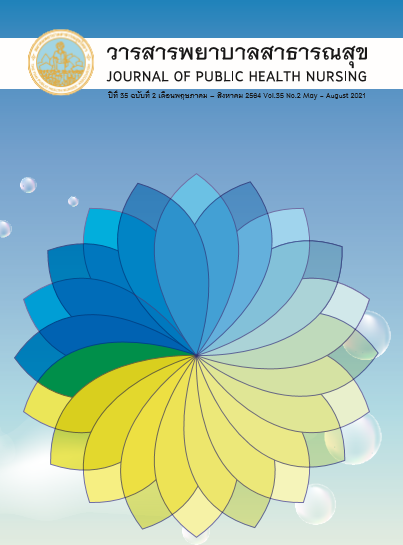Effect of Health-promoting program on self-care behaviors of diabetic patients
Keywords:
Self-care, Diabetes Mellitus, Health-promoting behaviorsAbstract
Diabetes mellitus is a crucial chronic disease that leads to complications in patients with uncontrolled glucose levels. This quasi-experiment study with a one-group Pre-Posttest research design aimed to evaluate a health-promoting self-care management program of diabetic patients. A sample of 30 diabetic patients participated in this study, receiving a health-promoting program for 12 weeks. Methods included a visual slide display, group discussion, a training demonstration, a good model presentation, and a self-caring handbook. Research instruments included the health-promoting program and self-care behavior and knowledge questionnaires. The content validity index of the questionnaires was 0.92, and reliability .81 and .83, respectively. Data were reported by descriptive statistics and analyzed using paired t-test.
Results show that participants in the health-promoting program had a statistically significant increase in self-care knowledge and self-care behaviors score (t=7.82, t=5.09, p<.01), and the mean score of hemoglobinA1c was statistically significantly lower than the pre-test score (t=2.14, p<.05). Results indicate that a diabetes health-promoting program could increase knowledge, self-care behaviors and prevent diabetic complications. Therefore, it is recommended that the program be used for diabetic patients with uncontrolled glucose.
References
World Health Organization. Diabetes fact sheet. [Internet]. 2021 [cited 2021 March 13]. Available from https://www.who.int/news-room/fact-sheets/detail/diabetes.
Diabetes Association of Thailand. Clinical Practice Guideline for diabetes 2017; 2017.
Zahra Y, Reza P, Mohammad RA, Nastaran A, Leila R, Mohammad YRP. Assessment of Self-care Practice and Its Associated Factors among Diabetic Patients in Urban Area of Urmia, Northwest of Iran. Journal of Research in Health Sciences 2011; 11(1): 33-8.
Suwannee S, Angkkana R, Kwansuwee A, Nilubon N, Juthamart S. Perceived Self-care behavior among patients with Type 2 Diabetes Mellitus with poor Glycemic control. Journal of Phrapokklao Nursing collage 2017; 28(2): 93-105. (in thai)
Kwanruen K, Chanida M. Factor Associated with Blood Sugar Controlling among the elderly with diabetes, living in communities nearby Siam University. Journal of nursing Siam University 2019; 20(38): 82-95. (in Thai)
Thanawat S. Facctor Related to blood Sugar Control among Diabetes Mellitus Type 2 patients. Journal of Health System Research 2018; 12(3): 515-22. (in Thai)
Choi W-H, Seo Y-M. Ha Y. Evaluation of factors related to glycaemic control among South Korean patients with type 2 diabetes. Int J Nurs Pract. 2018; 24: e12616. doi.org/10.1111/ijn.12616
Duanghathai S, Anothai P, Nilawan N. Factor affecting behaviors to reduce blood sugar levels ofdiabetic patients in Bangpoomai Tambon Health promoting Hospital, Samutprakarn Province. Valaya Alongkorn Review 2018; 8(1): 103-17. (in Thai)
Wannarr C. Self-care behaviors among Diabetes Miletus patients at Bang Mea Nang Bang Yai Disdrict Nonthaburi Province. Pathumthani University Academic Journal 2014; 6(3): 163-75. (in Thai)
Fathi AA, Malik SM, Abubaker IE, Sulafa IA, Zeinab AE. Influence of self-efficacy management on adherence to self-care activities and treatment outcome among diabetes mellitus type 2 Sudanes patients. Pharmacy Practice 2018; 16(4): 1274-90.
Ankita S, Ajeet SN, Arpit S, Sadhana M, Smiriti S. Effectiveness of an Educational Intervention via Health Belief Model in Promoting Self Care Behavior in Type II Diabetes Mellitus Patients in Lucknow Province of Uttar Pradesh, India: Randomized Controlled trial. International Journal of Contemporary Medical Research 2021; 8(2): 22-8. (in Thai)
Sheida V, Sima ES, Davoud S, Hamid H, Soghra N. The effect of an Educational Program Based on the Health Belief Model on Self-Efficacy among Patients with Type 2 Diabetes Referred to the Iranian Diabetes Association in 2014. Journal of Diabetes Mellitus 2015; 5(3): 181-9
Rosenstock IM, Strecher VJ, Becker HM. Social learning theory and the health belief model. Health Education Quarterly 1988; 15(2): 175–183.
Pornphimon U. Using health behavior modification Program for Patients on framework of the health belief model and the theory Self-efficacy with type 2 diabetes patients at Phanom hospital, Phanom district, Krabi province. Community health development Quarterly Khon Kaen University 2015; 3(3): 441-52. (in Thai)
Chintana H, Naiyana P, Raweewan P. Effect of the Perceived Health Belief Promoting Program on Behavior Delaying Progression of Chronic Kidney Disease among the elderly with Type 2 Diabetes Mellitus at Risk of Chronic Kidney Disease, Songklanagarind Journal of Nursing. 2014; 34(2): 67-85. (in Thai)
Parisa S, Mohammad SAZ, Kourosh S, Mostafa Q, Omid S, Babak R, Morteza M. Effect of educational intervention based on the Health Belief model on promoting self-care behaviors of type-2 diabetes patients. Electronic physician 2017; 9(12): 5960-8.
Wiyathus D, Synlapkitkosol U. Effectiveness of Group learning process program on Health Behaviors and Glycosylated Hemoglobin of Uncontrolled type 2 diabetic patients attended diabetic clinic at Phanomsarakham Hospital. Thai Journal of nursing and midwifery practice 2018; 5(2): 39-54. (in Thai)
Downloads
Published
How to Cite
Issue
Section
License
บทความที่ตีพิมพ์และแผนภูมิรูปภาพถือเป็นลิขสิทธิ์ของวารสารพยาบาลสาธารณสุข (Thai Public Health Nurses Association)







